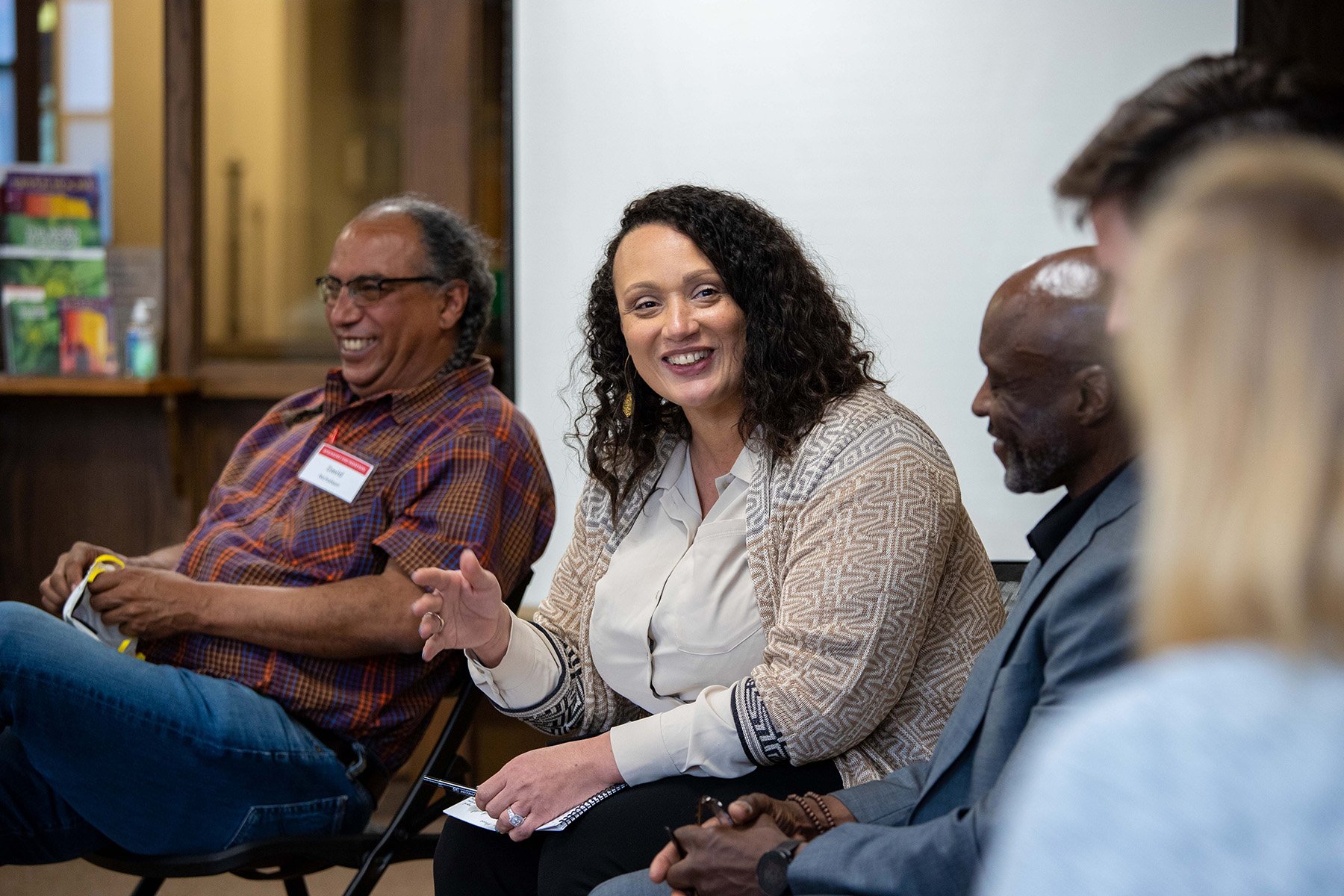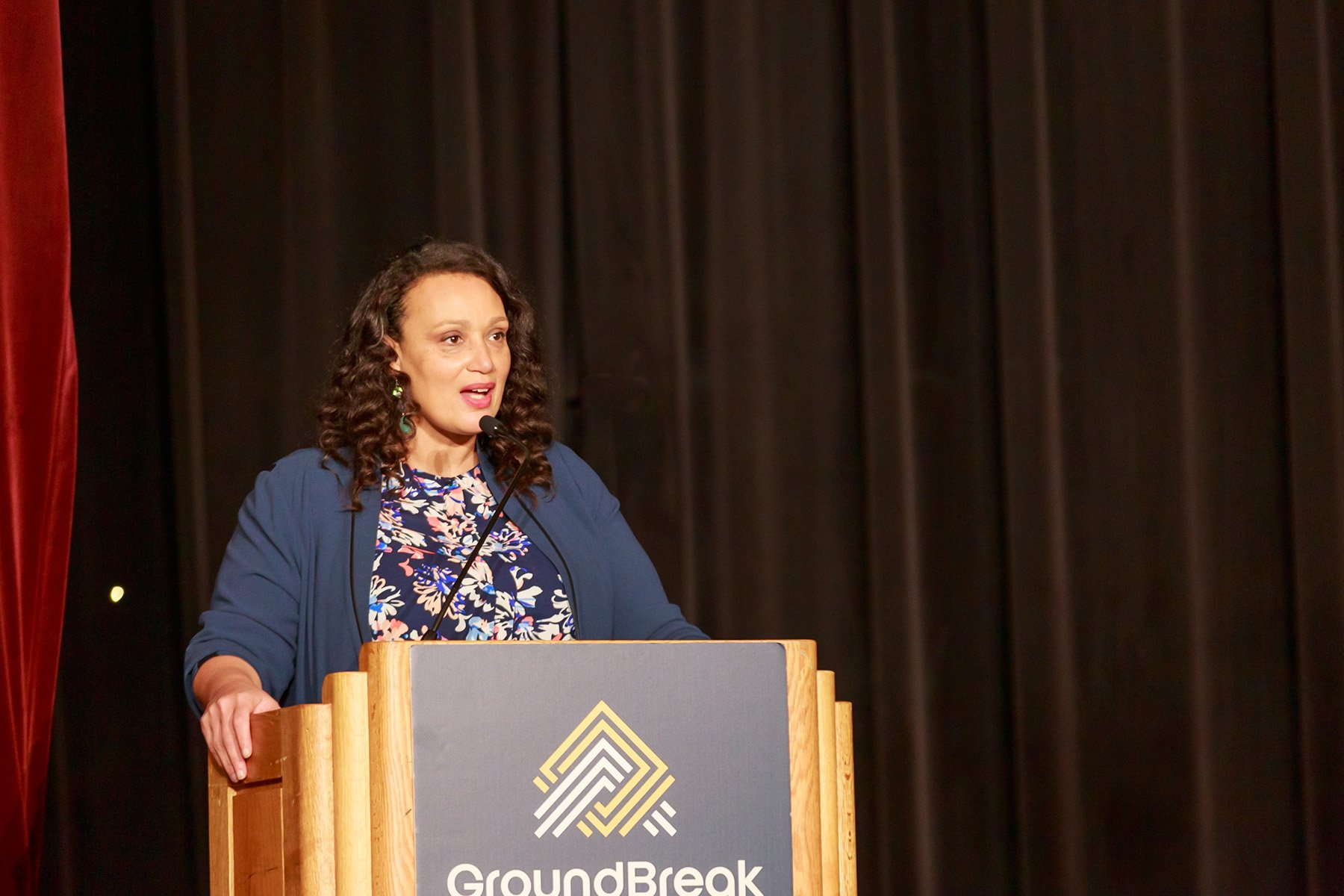A Conversation with McKnight Foundation President Tonya Allen
Allen highlights the philanthropic organization’s efforts to advance climate action and racial equity in the region
Interview by Alicia Belton, FAIA | November 16, 2023
Tonya Allen at the McKnight Foundation office in Minneapolis’s historic Mill District. Photo by Chad Holder.
2023 PRINT ANNUAL
This feature appeared in the 2023 ENTER print annual, available for purchase here.
Tonya Allen joined the McKnight Foundation as president in 2021 at a pivotal time. The Minneapolis-based family foundation had recently developed a new strategic framework that placed an increased emphasis on two programs: Midwest Climate & Energy and Vibrant & Equitable Communities. ENTER sat down with Allen to discuss the new imperatives and strategies guiding the organization’s work.
How had McKnight been evolving prior to your arrival, and how is it continuing to evolve?
The McKnight Foundation’s evolution is why I came. They had started to rethink how they wanted to have impact in the region. In 2019, the foundation essentially adopted twin imperatives: climate change and racial equity. In 2019 and 2020, McKnight was going through the transition of closing some programs and scaling up investment in Midwest Climate & Energy and Vibrant & Equitable Communities. We invest $32 million in each of those programs on an annual basis. When I was recruited for the position of president, I was excited that they were making this courageous decision. But to make a courageous decision and to be courageous are two different things.
My focus, effort, and energy has really been about helping the organization integrate these twin imperatives into everything we do. We call them our headlines and our throughlines. They’re a part of everything we do in trying to advance big, complex change efforts.
Reducing emissions and advancing clean energy takes both structural and cultural change. It’s the same thing around racial equity. We need to be strategic and thoughtful as we try to do good work. We also need to assemble a big enough tent that we have space to engage and partner with others.
Are you already seeing the impacts of the change you’re talking about?
Yes, I am. We describe the change in its simplest form as going from grant-maker to change-maker. As a grant-maker, McKnight historically had done lots of change-making activities, but we didn’t always leverage the full weight of our institutional power and resources in a consistent and coordinated way. Now, we want to show up and roll up our sleeves, in deep partnership with community on these issues that we think are really important.
One of the ways that intention is showing up is with our GroundBreak Coalition, which was created to tackle the racial wealth gap in our region. What we know is that whenever we try and tackle the issue of racial wealth—when we talk about growing Black businesses, helping the BIPOC community be homeowners, aiding the recovery down Lake Street and other cultural corridors after George Floyd’s murder and the uprising—the question that always comes up is capital.
How do we access capital? How do we make capital flow into these communities to support these projects? That’s what GroundBreak is about. It’s about pulling together financial institutions, corporations, government, philanthropy, nonprofit organizations, and community partners and asking, “What would it take for us to do systemic work on releasing capital—to make it more accessible and equitable—and create a more climate-resilient region?”
“I believe we’re ready to do this hard work as a region,” Allen told architect Alicia Belton (foreground). Photo by Chad Holder.
What are some of the opportunities and roadblocks the coalition has identified or encountered so far? I know the effort is just getting started.
Minnesota is a very proud place. That’s a real opportunity. What I mean by that is, I think we are all deeply ashamed by what happened to George Floyd, Philando Castile, and Jamar Clark. People understand that George Floyd wasn’t an anomaly. We are seeing people want to wrestle with the issue because it’s not just about how we look at ourselves; it’s also about how the world looks at us.
I think the Twin Cities have a point to make. We can be a place where racial tragedy happens, or we can be a place where we have racial transformation. We have people who feel like they have a personal point to make, and we have extraordinary leaders who are willing to do extraordinary things.
As you said, we’re proud of where we’re from, but we’re also stuck in the ways we’ve always done things. How do you break through that?
So, I’ll highlight a few of the roadblocks. One is that we are a fairly rich region. That’s both a plus and a minus. The negative is that we have enough to go it alone. It doesn’t really force us to act together, right? We need to let go of that cultural notion that we can do it by ourselves.
The second roadblock gets to your question. It’s the discomfort around the fact that creating systemic change requires us to give up some things—the old practices and workarounds that we’ve established in our community.
“The solutions we design [need to be] forward-leaning and represent the interests and the intelligence of the people who live there. We need to help enable the ideas and aspirations folks have for their homes and neighborhoods.”
I was with a group of people recently talking about some of the recommendations coming out of GroundBreak. A few folks worried that enacting the recommendations might mean we have to stop funding something else. That’s a big concern because many grantees rely on consistent funding and support. Someone asked, in so many words, “Is the pain worth the progress?” In other words, if we do some of the work needed to create systems reform, is it going to be worth it? An African American community leader answered, “Absolutely. We cannot continue to do the same things in the same way and expect a different outcome.”
There are hard decisions to be made in the work of systems change.
The hard decisions aren’t just about who gets funding and who doesn’t. Building up funds and organizing money is the least complex part of GroundBreak’s job. The harder work lies in fundamental changes in the institutions themselves. For example, how do we rework our systems so that the onus of putting together capital stacks isn’t on the projects but on the financial institutions? That’s hard work. That’s cultural paradigm shifting, getting people to work in more aligned and collaborative ways, even if they are competitors. That’s the work that creates a new platform for change.
I believe we’re ready to do this hard work as a region. We’ve seen people do innovative and creative things. When the financial institutions came together to bring First Independence [a Black-owned bank] into the market, that was a hard thing for them to do. It strengthened a civic muscle that we can build on. When you keep building to do more hard things, you learn how to do the impossible. That’s what I’m hoping for us.
Does McKnight work to foster synergies between climate change and racial equity?
I don’t think you can separate the two. They are inextricably tied, because the impacts of climate change are usually compounded for people who have the least or who have the most challenges. So, how do we help the most disadvantaged in our communities through their homes and through the spaces around their homes where they work?
Photos 1 and 2: Allen and McKnight colleagues at a board retreat field day, and Allen speaking at the GroundBreak Coalition launch in May 2022. Photos courtesy of the McKnight Foundation.
I think the way that we begin to address that in our region is, one, by electrifying everything. And two, by making sure that our strategies show up in our community development practices. With the passage of policy solutions like the Infrastructure Investment and Jobs Act at the federal level and the 100 Percent Clean Energy legislation at the state level, we have a tremendous opportunity at our fingertips. We can make transformative change happen and advance bold climate solutions that address the climate crisis, improve quality of life for all residents, and create prosperity for more people. At the same time, we must make sure that we are prioritizing equity and engaging the communities too often left out of decision-making as we implement these laws and design solutions for our future. If we get this right, Minnesota can become a model for how to deliver economic mobility and community vitality through a just transition to clean energy.
Another example is through the issue of housing. McKnight has been a long-time funder around affordable housing. That work is about more than simply meeting the need. It’s about making sure that the solutions we design are forward-leaning and represent the interests and the intelligence of the people who live there. We need to help enable the ideas and aspirations folks have for their homes and neighborhoods.
The needs that McKnight and its grantees are seeking to address are immense and complex. As an organizational leader, how do you fuel yourself and your team to stay in this challenging work?
Well, one, you celebrate the wins. I often use the “Do not despise small beginnings” quotation from the bible. When we think about transformative change, we’re often thinking about the big things we can accomplish. But we cannot ignore the fact that transformative change requires many small actions. So, I try to celebrate the contributions we’re all making.
Focusing on contribution over attribution gives us a greater ambition because it reminds us that it’s not about what I can accomplish; it’s about what we get to accomplish together. That’s a big part of how I stay inspired.
Yesterday was Martin Luther King Jr. Day, and I’m thinking of his famous line, “the arc of the moral universe is long, but it bends toward justice.”
We either make history that people will applaud, or we make history that people will shake their heads at in consternation. What I would like to see is that we have radical love. The word philanthropy comes from two Greek words that mean “to love” and “humankind.” It’s strange that, when we talk about philanthropy, we never talk about love. We talk about strategy, not about why we do this and what’s important. Rooting the work in the love of humanity is so important.
The radical part for me is about getting to the root of the issue. If you are showing up with radical love, you have more boldness and courage. You’re trying to understand the needs of people, and you’re trying to right wrongs. Racial equity is about repairing harm. People sometimes think it’s about reducing something that they have. It’s really about enabling something for others who have been harmed by the systems we have built around them. We can repair the harm.
AIA Minnesota, the publisher of ENTER, is a McKnight Foundation grant recipient for multiple projects focused on fostering equity in the built environment. The McKnight Foundation also has provided grant funding for the Redesign, Inc.–led redevelopment of the Coliseum Building on Lake Street in Minneapolis. Alicia Belton, FAIA, is the renovation architect and a co-owner of the Coliseum Building.






